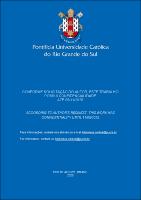| Share record |


|
Please use this identifier to cite or link to this item:
https://tede2.pucrs.br/tede2/handle/tede/9321| Document type: | Dissertação |
| Title: | Frequência de mutações no gene CFTR e indicações do tratamento com moduladores em pacientes com fibrose cística |
| Author: | Lima, Eliandra da Silveira de  |
| Advisor: | Pinto, Leonardo Araújo |
| Abstract (native): | Objetivo: determinar a distribuição das mutações CFTR em um grupo de pacientes em acompanhamento em centro multidisciplinar de tratamento para fibrose cística (FC) no Sul do Brasil, assim como descrever as mutações candidatas ao uso de medicamentos mutações específicas. Métodos: este é um estudo transversal descritivo. Foram incluídos pacientes em acompanhamento em centro de referência para FC, com diagnóstico clínico de FC e com os dois alelos identificados com mutações patogênicas. Resultados: foram avaliados 92 pacientes. As mutações mais prevalentes no centro de referência foram F508del, R1162X, G542X e N1303K. Quanto aos pacientes com indicação de uso de drogas mutações específicas, 69,6% são candidatos ao uso de Elexacaftor/Tezacaftor/Ivacaftor (Trikafta®), 44,6% ao uso de Tezacaftor/Ivacaftor (Symdeko®) e 35,9% ao uso de Lumacaftor/Ivacaftor (Orkambi®). São candidatos ao uso de Ivacaftor (Kalydeco®) apenas 2 (2,2%), conforme aprovação brasileira para o uso do medicamento. De acordo com o FDA, seriam candidatos 10 pacientes para Ivacaftor (10,9%). Conclusão: mutações de classe I e II, relacionadas com maior gravidade da doença, foram identificadas em 135 dos 184 alelos (73,3%). No presente estudo, mais de 2/3 dos pacientes são candidatos ao uso dos tratamentos moduladores do CFTR. |
| Abstract (english): | Objective: the aim of the study was to determine the distribution of the CFTR mutations in a group of patients followed at a cystic fibrosis (CF) center in the South of Brazil, as well as describing the candidate mutations to use specific mutation drugs. Methods: this is a descriptive cross-sectional study. The study included patients followed at a CF reference center, with a clinical diagnosis of CF and with both alleles identified with pathogenic mutations. Results: ninety-two patients were assessed. The most prevalent mutations were F508del, R1162X, G542X, and N1303K. Regarding the patients with indication for specific-mutation for the use of modulators, 69.6% are candidates for the use of Elexacaftor/Tezacaftor/Ivacaftor (Trikafta®), 44.6% for the use of Tezacaftor/Ivacaftor (Symdeko®) and 35.9% for the use of Lumacaftor/Ivacaftor (Orkambi®). For the use of Ivacaftor (Kalydeco®), only 2 patients (2.2%) are candidates, in accordance with the Brazilian agency approval. According to FDA, 10 patients would be candidates for Ivacaftor (10.9%). Conclusions: mutations class I and II, which are related to a major severity of the illness, were identified in 135 of 184 alleles (73.3%). In this study, more than 2/3 of the patients are candidates for the use of CFTR modulators therapy. |
| Keywords: | Fibrose Cística CFTR Mutação Genética Cystic Fibrosis Mutation Genetics Treatment |
| CNPQ Knowledge Areas: | CIENCIAS DA SAUDE::MEDICINA |
| Language: | por |
| Country: | Brasil |
| Publisher: | Pontifícia Universidade Católica do Rio Grande do Sul |
| Institution Acronym: | PUCRS |
| Department: | Escola de Medicina |
| Program: | Programa de Pós-Graduação em Medicina/Pediatria e Saúde da Criança |
| Access type: | Acesso Aberto |
| Fulltext access restriction: | Trabalho será publicado como artigo ou livro |
| Time to release fulltext: | 60 meses |
| Date to release fulltext: | 05/11/2025 |
| URI: | http://tede2.pucrs.br/tede2/handle/tede/9321 |
| Issue Date: | 28-Mar-2020 |
| Appears in Collections: | Programa de Pós-Graduação em Pediatria e Saúde da Criança |
Files in This Item:
| File | Description | Size | Format | |
|---|---|---|---|---|
| DIS_ELIANDRA_DA_SILVEIRA_DE_LIMA_CONFIDENCIAL.pdf | ELIANDRA_DA_SILVEIRA_DE_LIMA_DIS | 887.11 kB | Adobe PDF |  Download/Open Preview |
Items in DSpace are protected by copyright, with all rights reserved, unless otherwise indicated.




